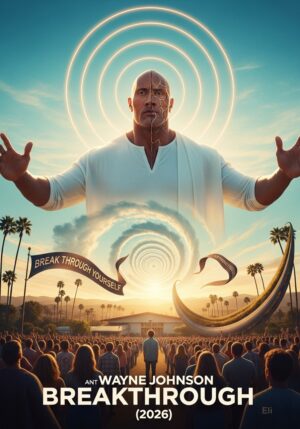A promise of purpose. A descent into darkness.
Set against the palm-lined streets and sun-bleached calm of early 2000s Southern California, Breakthrough peels back the glossy surface of self-help culture to expose the deep and dangerous undercurrents beneath. This haunting psychological drama — written by Zeke Goodman and directed by Darren Aronofsky — charts the unraveling of one young man’s identity in the grip of a movement that promises rebirth, but demands surrender.
At the heart of the story is Eli, a quiet, emotionally adrift young man whose life feels increasingly untethered. Seeking purpose, he stumbles into the magnetic orbit of Dominic Vale (Dwayne Johnson) — a larger-than-life self-help guru whose movement, Breakthrough, preaches discipline, clarity, and empowerment through pain. To Eli, Dominic is a beacon: confident, commanding, and seemingly filled with the answers he’s never found on his own.
At first, it feels real. Uplifting. Eli experiences a newfound sense of agency and community. Dominic’s philosophy — “Strength through struggle, vision through sacrifice” — resonates like scripture. But as Eli is drawn deeper into the inner sanctum of the movement, the glow begins to flicker. Methods become more extreme. Control replaces clarity. And what once felt like salvation slowly begins to resemble submission.
Aronofsky’s signature psychological intensity permeates every frame of Breakthrough, layering tension and dread into a deceptively idyllic world. He uses silence, symmetry, and surreal flourishes to blur the line between devotion and delusion, guiding the audience through Eli’s transformation from eager seeker to something far more fractured.
In a performance that shatters expectations, Dwayne Johnson delivers a chilling turn as Dominic — a man whose charisma is both his weapon and his mask. Gone is the warmth of his typical roles; here, he is seductive and surgical, manipulating vulnerability with frightening ease. It’s a role that redefines Johnson’s range, revealing a character as compelling as he is unnerving.
As Eli’s world contracts, loyalty turns to obsession, and identity begins to dissolve. With a searing emotional core and a terrifying sense of realism, Breakthrough becomes more than a story of manipulation — it becomes a mirror to our era. In a time of influencers, hyper-individualism, and spiritual commodification, it asks: how far would you go to feel whole? And what happens when the person showing you the way is leading you over a cliff?
Breakthrough is not just a psychological drama — it’s a cautionary tale for a world desperate to be healed.

Leave a Reply